
Standards development activities update for February 2022
Code Council releases update on standards that are current, being revised or are under new development
There is a long-standing relationship between construction codes and standards that address design, installation, testing and materials related to building construction. Building regulation cannot be effectively carried out without such standards. The critical role of standards in the building regulatory process is such that the standards are an extension of the code requirements and are therefore equally enforceable. Consequently, standards that are referenced in codes carry an expectation of being as clear, direct and enforceable as code requirements that are primarily text.
As an ANSI-accredited standards developing organization, the International Code Council can respond to the needs of its membership in developing standards for reference in the International Codes (I-Codes). As part of the ANSI accreditation, the Code Council has written consensus procedures to outline the development of standards in the most time-efficient manner. Development can include both existing standards on a five-year revision cycle as well as brand new standards to address new challenges faced by the building industry. Code Council standards are updated to reflect current industry practice for the building industry and maintain ANSI approval as American National Standards.
The best way to understand the standards development process is to take a step-by-step approach. The Code Council develops its standards through an ANSI-accredited consensus process that includes gathering input from the Code Council’s membership, industry professionals and the public. The result is a standard that reflects current industry best practices. The Code Council recently developed an infographic — The Process of Developing an ICC Standard — which outlines the five main steps in the process. Think of the Code Council as a provider of the platform to develop standards relevant to the Code Council’s membership and the I-Codes. It’s easy to get involved with the standards development process and your participation ensures that you have a voice in standardizing ways of driving business as well as compliance practice.
A helpful Code Council webinar was prepared in April 2021 to highlight the steps taken during an ICC standards development project. As part of the Code Council’s Learn Live offerings, the webinar can provide continuing education for those wishing to enhance their knowledge of the standards developing process for ANSI approval as an American National Standard.
Below is a list of International Code Council standards that are current, being revised or are under new development.
ICC 300 — Standard for Bleachers, Folding and Telescopic Seating, and Grandstands
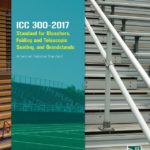 Standard ICC 300 — Standard for Bleachers, Folding and Telescopic Seating, and Grandstands addresses the unique concerns associated with bleacher seating. It addresses new and existing installations of all types of bleacher seating including fixed and folding bleachers intended for indoor, outdoor, temporary and permanent use. This standard is intended to coordinate with the means of egress systems in the building codes.
Standard ICC 300 — Standard for Bleachers, Folding and Telescopic Seating, and Grandstands addresses the unique concerns associated with bleacher seating. It addresses new and existing installations of all types of bleacher seating including fixed and folding bleachers intended for indoor, outdoor, temporary and permanent use. This standard is intended to coordinate with the means of egress systems in the building codes.
The 2017 edition of ICC 300 is available online and in the Code Council store.
Visit the ICC Consensus Committee on Bleacher Safety (IS-BLE) webpage for more information on standards activities related to IS-BLE as well as meeting notices and agendas, committee information, and other resources.
| UPDATES: The 2017 edition of the standard was approved by ANSI as an American National Standard in December of 2017. Public comments of a technical nature were received by the March 8, 2021, deadline during the ANSI public review period for reaffirmation. Therefore, the Code Council has opened a formal revision cycle to address the comments. The Code Council Board of Directors made committee appointments in October 2021. The first public meeting of the committee is scheduled for 2:00 p.m. ET on Feb. 7, 2022, with subsequent meetings at two-week intervals. |
ICC 400 — Standard on the Design and Construction of Log Structures
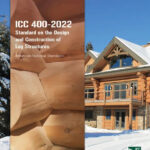 Standard ICC 400 — Standard on the Design and Construction of Log Structures establishes the minimum design requirements for log structures to safeguard the public health, safety and welfare through structural, thermal envelope, fire resistance and setting provisions. This standard is intended for adoption by local governmental agencies and organizations setting model codes to achieve uniformity in technical design criteria in building codes and other regulations.
Standard ICC 400 — Standard on the Design and Construction of Log Structures establishes the minimum design requirements for log structures to safeguard the public health, safety and welfare through structural, thermal envelope, fire resistance and setting provisions. This standard is intended for adoption by local governmental agencies and organizations setting model codes to achieve uniformity in technical design criteria in building codes and other regulations.
The 2022 edition of ICC 400 is available online and in the Code Council store.
Visit the ICC Consensus Committee on Log Structures (IS-LOG) webpage for more information on standards activities related to IS-LOG as well as meeting notices and agendas, committee information, and other resources.
| UPDATES: The revision cycle to update the 2017 edition of ICC 400 has recently concluded. The standard was ANSI approved on Sept. 14, 2021. The Code Council greatly appreciates the effort and commitment that the committee recently put forth to develop the 2022 edition. |
ICC 500/NSSA Standard for the Design and Construction of Storm Shelters
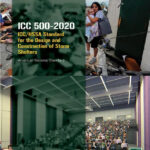 Standard ICC 500 — ICC/NSSA Standard for the Design and Construction of Storm Shelters is published jointly by the International Code Council and the National Storm Shelter Association (NSSA) and is referenced in the newest building safety codes. The standard establishes the minimum design and construction requirements for storm shelters to safeguard the public health, safety and welfare relative to the design, construction and installation for protection from high winds associated with tornados and hurricanes. This standard provides design requirements for the main wind resisting structural system and components and cladding of these shelters and provides basic occupant life safety and health requirements for these shelters, including means of egress, lighting, sanitation, ventilation, fire safety, and minimum required floor space for occupants. This standard is intended for adoption by local governmental agencies and organizations setting model codes to achieve uniformity in the technical design and construction of storm shelters.
Standard ICC 500 — ICC/NSSA Standard for the Design and Construction of Storm Shelters is published jointly by the International Code Council and the National Storm Shelter Association (NSSA) and is referenced in the newest building safety codes. The standard establishes the minimum design and construction requirements for storm shelters to safeguard the public health, safety and welfare relative to the design, construction and installation for protection from high winds associated with tornados and hurricanes. This standard provides design requirements for the main wind resisting structural system and components and cladding of these shelters and provides basic occupant life safety and health requirements for these shelters, including means of egress, lighting, sanitation, ventilation, fire safety, and minimum required floor space for occupants. This standard is intended for adoption by local governmental agencies and organizations setting model codes to achieve uniformity in the technical design and construction of storm shelters.
The 2020 edition of ICC 500 is available online and in the Code Council store.
Visit the ICC Consensus Committee on Storm Shelters (IS-STM) webpage for more information on standards activities related to IS-STM as well as meeting notices and agendas, committee information, and other resources.
| UPDATES: The Code Council greatly appreciates the effort and commitment that the committee recently put forth to develop the 2020 edition. The 2020 edition was approved by ANSI as an American National Standard on Nov. 2, 2020, and is available in the Code Council store. The committee has elected to place ICC 500 under continuous maintenance in order to keep the standard up-to-date with changing developments in the field. Under a continuous maintenance schedule, the consensus body considers recommended changes to any part of the document. The Code Council accepts public comments and proposals for this standard on a continual basis and during regular calls for comment. Notice of the upcoming public meetings of the committee will be posted to the IS-STM committee webpage. The standard has been posted for the ANSI public review period with a deadline to receive comments by March 14, 2022. The committee anticipates scheduling a public meeting for the first quarter of 2022. |
ICC 600 — Standard for Residential Construction in High-Wind Regions
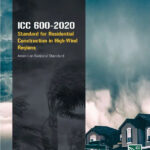 Standard ICC 600 — Standard for Residential Construction in High-Wind Regions is based on content from SSTD 10 (Hurricane Resistant Construction Standard) and material standards’ and is to specify prescriptive methods to provide wind-resistant designs and construction details for residential buildings of masonry, concrete, wood-framed or cold-formed steel framed construction sited in high-wind regions where design wind speeds are 120 to 180 mph. The purpose of this standard is to improve building resiliency by providing prescriptive requirements based on the latest engineering knowledge and to provide minimum requirements to improve structural integrity and improve building envelope performance within the limitations in building geometry, materials, and wind climate specified.
Standard ICC 600 — Standard for Residential Construction in High-Wind Regions is based on content from SSTD 10 (Hurricane Resistant Construction Standard) and material standards’ and is to specify prescriptive methods to provide wind-resistant designs and construction details for residential buildings of masonry, concrete, wood-framed or cold-formed steel framed construction sited in high-wind regions where design wind speeds are 120 to 180 mph. The purpose of this standard is to improve building resiliency by providing prescriptive requirements based on the latest engineering knowledge and to provide minimum requirements to improve structural integrity and improve building envelope performance within the limitations in building geometry, materials, and wind climate specified.
After the revision of ICC 600, the committee will continue to develop a 600 series of hazard mitigation standards to specify enhanced prescriptive methodologies that affected municipalities can adopt. The committee will be designated as the Multi-Hazard Resiliency for Residential Construction Committee (IS-MHRRC). The new standards to be developed are:
- ICC 605: Standard for Residential Construction in Regions with Wildfire Hazard
- ICC 610: Standard for Residential Construction in Regions with Seismic Hazard
- ICC 615: Standard for Residential Construction in Regions with Tsunami Hazard
The 2020 edition of ICC 600 is available online and in the Code Council store.
Visit the ICC Multi-Hazard Resiliency for Residential Construction Committee (IS-MHRRC) webpage for more information on standards activities related to IS-MHRRC as well as meeting notices and agendas, committee information, and other resources.
| UPDATES: Many thanks to the hard work and expertise of all the committee members and interested parties that contributed to the 2020 edition. The ICC 600-2020 standard was approved by ANSI as an American National Standard on Dec. 1, 2020, and is available in the Code Council store. The next order of committee business will be to begin the development of the ICC 605 standards. Notice of the upcoming public meetings of the committee will be posted to the IS-MHRRC committee webpage. |
ICC 700 — National Green Building Standard
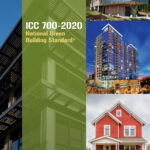 The ICC 700 —National Green Building Standard (NGBS) has been approved by the American National Standards Institute for all types of sustainable residential construction. A collaborative effort of the International Code Council, ASHRAE and the National Association of Home Builders, NGBS outlines a variety of green practices that can be incorporated into new homes and multifamily buildings, as well as hotels, dormitories and land developments. The standard also delivers stand-alone chapters for both home remodeling and additions and renovations of multifamily buildings. The green practices address site and lot design, preparation and development; resource, energy and water efficiency; indoor environmental quality; and operation, maintenance and building owner education.
The ICC 700 —National Green Building Standard (NGBS) has been approved by the American National Standards Institute for all types of sustainable residential construction. A collaborative effort of the International Code Council, ASHRAE and the National Association of Home Builders, NGBS outlines a variety of green practices that can be incorporated into new homes and multifamily buildings, as well as hotels, dormitories and land developments. The standard also delivers stand-alone chapters for both home remodeling and additions and renovations of multifamily buildings. The green practices address site and lot design, preparation and development; resource, energy and water efficiency; indoor environmental quality; and operation, maintenance and building owner education.
The 2020 edition of ICC 700 is available online and in the Code Council store.
ASABE/ICC 802 Landscape Irrigation Sprinkler and Emitter Standard
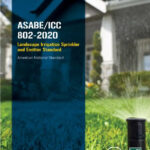 The ASABE/ICC 802 Landscape Irrigation Sprinkler and Emitter Standard establishes design and testing requirements for landscape irrigation sprinklers, bubblers, drip emitters and microsprays. It provides minimum design and performance requirements, specifies uniform test methods for product performance, and sets definitions and product classifications for commonly used sprinklers and emitters. The consensus standard was developed through the Code Council’s ANSI-accredited standards development process in collaboration with the American Society of Agricultural and Biological Engineers (ASABE).
The ASABE/ICC 802 Landscape Irrigation Sprinkler and Emitter Standard establishes design and testing requirements for landscape irrigation sprinklers, bubblers, drip emitters and microsprays. It provides minimum design and performance requirements, specifies uniform test methods for product performance, and sets definitions and product classifications for commonly used sprinklers and emitters. The consensus standard was developed through the Code Council’s ANSI-accredited standards development process in collaboration with the American Society of Agricultural and Biological Engineers (ASABE).
The 2020 edition of ASABE/ICC 802 is available online and in the Code Council store.
Visit the ICC Landscape Irrigation Emission Devices Standard Consensus Committee (IS-IEDC) webpage for more information on standards activities related to IS-IEDC as well as meeting notices and agendas, committee information, and other resources.
| UPDATES: The Code Council greatly appreciates the effort and commitment that the committee recently put forth to develop the 2020 edition. The 2020 edition was approved by ANSI as an American National Standard on Nov. 5, 2020, and is available in the Code Council store. |
ICC 805 — Rainwater Harvesting Systems
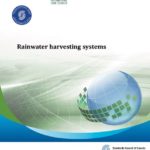 Standard CSA B805/ICC 805 — Rainwater Harvesting Systems addresses roof surface rainwater and stormwater (i.e., rainwater that has come in contact with the ground or a green roof) being used as source water. The standard addresses rainwater intended for use in non-potable applications (e.g., irrigation, fire protection, toilet and urinal flushing, clothes washing, hose bibbs, decorative fountains, and vehicle washing) as well potable applications (e.g., human consumption, oral care, food preparation, dishwashing and bathing). The term “rainwater harvesting” is used generically in this standard and can refer to harvesting of either roof runoff or stormwater runoff.
Standard CSA B805/ICC 805 — Rainwater Harvesting Systems addresses roof surface rainwater and stormwater (i.e., rainwater that has come in contact with the ground or a green roof) being used as source water. The standard addresses rainwater intended for use in non-potable applications (e.g., irrigation, fire protection, toilet and urinal flushing, clothes washing, hose bibbs, decorative fountains, and vehicle washing) as well potable applications (e.g., human consumption, oral care, food preparation, dishwashing and bathing). The term “rainwater harvesting” is used generically in this standard and can refer to harvesting of either roof runoff or stormwater runoff.
The 2018 edition of CSA B805/ICC 805 is available online and in the Code Council store. It is both ANSI-approved and SCC-accredited.
Visit the ICC Rainwater Collection System Design and Installation Consensus Committee (IS-RCSDI) webpage for more information on standards activities related to IS-RCSDI as well as meeting notices and agendas, committee information, and other resources.
| UPDATES: Published in February of 2019, the CSA B805/ICC 805 standard is referenced in the 2021 International Plumbing Code. The Code Council has had recent discussions with CSA staff on developing the next edition of the standard. A meeting of the joint technical committee is scheduled for 1:00 p.m. ET on Feb. 8, 2022, to discuss reaffirmation or opening a formal revision cycle. |
ICC 900/SRCC 300 — Solar Thermal System Standard
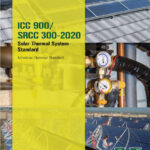 The ICC 900/SRCC 300 — Solar Thermal System Standard establishes minimum requirements for the system design, performance evaluation, and installation instructions of solar water heating systems. This standard establishes a methodology for rating the performance of solar water heating systems based on performance projections and solar collector test data. This standard is applicable to residential and commercial solar water heating systems intended for use within swimming pool heating, building space heating, building space cooling, and/or water heating systems. It is applicable to both direct and indirect solar water heating systems. The expanded use of renewable energy systems in modern construction has resulted in the creation of sustainable construction codes and standards and energy incentive programs addressing solar thermal systems. In both cases, minimum criteria and uniform test methods are needed to ensure that solar thermal water heating systems provide suitable performance, durability, safety and comparable performance metrics.
The ICC 900/SRCC 300 — Solar Thermal System Standard establishes minimum requirements for the system design, performance evaluation, and installation instructions of solar water heating systems. This standard establishes a methodology for rating the performance of solar water heating systems based on performance projections and solar collector test data. This standard is applicable to residential and commercial solar water heating systems intended for use within swimming pool heating, building space heating, building space cooling, and/or water heating systems. It is applicable to both direct and indirect solar water heating systems. The expanded use of renewable energy systems in modern construction has resulted in the creation of sustainable construction codes and standards and energy incentive programs addressing solar thermal systems. In both cases, minimum criteria and uniform test methods are needed to ensure that solar thermal water heating systems provide suitable performance, durability, safety and comparable performance metrics.
The 2020 edition of ICC 900/SRCC 300 is available online and in the Code Council store.
Visit the ICC Solar Thermal Standard Consensus Committee (IS-STSC) webpage for more information on standards activities related to IS-STSC as well as meeting notices and agendas, committee information, and other resources.
| UPDATES: The latest revision cycle of the ICC/SRCC solar thermal standard has been concluded with the approval of the 2020 edition by ANSI on Dec. 3, 2020. The latest edition is available in PDF and hardcopy forms for purchase from the ICC bookstore. |
ICC 901/SRCC 100 — Solar Thermal Collector Standard
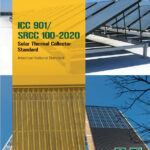 The ICC 901/SRCC 100 — Solar Thermal Collector Standard establishes minimum requirements for the design, construction, performance and testing of liquid and air heating solar thermal collectors, including those containing distributed assembly and integral concentrating components and integral storage and non-separable thermosiphon units. This standard is applicable to solar collectors intended for use within swimming pool and spa heating, building space heating and cooling, water heating systems, industrial/commercial process heating, and thermal input to electrical power production systems.
The ICC 901/SRCC 100 — Solar Thermal Collector Standard establishes minimum requirements for the design, construction, performance and testing of liquid and air heating solar thermal collectors, including those containing distributed assembly and integral concentrating components and integral storage and non-separable thermosiphon units. This standard is applicable to solar collectors intended for use within swimming pool and spa heating, building space heating and cooling, water heating systems, industrial/commercial process heating, and thermal input to electrical power production systems.
The 2020 edition of ICC 901/SRCC 100 is available online and in the Code Council store.
Visit the ICC Solar Thermal Standard Consensus Committee (IS-STSC) webpage for more information on standards activities related to IS-STSC as well as meeting notices and agendas, committee information, and other resources.
| UPDATES: The latest revision cycle of the ICC/SRCC solar thermal standard has been concluded with the approval of the 2020 edition by ANSI on Dec. 3, 2020. The latest edition is available in PDF and hardcopy forms for purchase from the ICC bookstore. |
ICC 902/PHTA 902/SRCC 400 — Solar Pool and Spa Heating System Standard
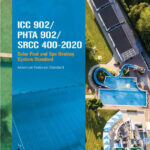 The ICC 902/PHTA 902/SRCC 400 — Solar Pool and Spa Heating System Standard establishes minimum criteria for the design and installation of solar water heating systems for pool and spa applications. It addresses both residential and commercial pools and spas, consistent with the requirements of the Code Council’s International Swimming Pool and Spa Code and other relevant ICC/PHTA standards for these applications. ICC 902/PHTA 902/SRCC 400 is a new standard that builds upon the well-established ICC 900/SRCC 300 Solar Water Heating Systems Standard that does not include pool and spa applications. This new standard allows pools and spas to benefit from sustainable heating technologies without sacrificing safety or performance.
The ICC 902/PHTA 902/SRCC 400 — Solar Pool and Spa Heating System Standard establishes minimum criteria for the design and installation of solar water heating systems for pool and spa applications. It addresses both residential and commercial pools and spas, consistent with the requirements of the Code Council’s International Swimming Pool and Spa Code and other relevant ICC/PHTA standards for these applications. ICC 902/PHTA 902/SRCC 400 is a new standard that builds upon the well-established ICC 900/SRCC 300 Solar Water Heating Systems Standard that does not include pool and spa applications. This new standard allows pools and spas to benefit from sustainable heating technologies without sacrificing safety or performance.
The 2020 edition of ICC 902/PHTA 902/SRCC 400 is available online and in the Code Council store.
Visit the ICC Pool Heating and Cooling Standard Consensus Committee (IS-PHSC) webpage for more information on standards activities related to IS-PHSC as well as meeting notices and agendas, committee information, and other resources.
| UPDATES: The standard was reaffirmed by the committee to bring all 900 series standards to a common revision cycle and was approved by ANSI on Dec. 3, 2020. The latest edition is available in PDF and hardcopy forms for purchase from the ICC bookstore. |
ICC 903/SRCC 500 — Solar Hot Water Storage Tank Standard
The ICC 903/SRCC 500 — Solar Thermal System Standard establishes minimum requirements for the design, construction and testing of hot water storage tanks designed for use as a component within solar water heating systems. It establishes test methods and minimum standards to ensure minimum levels of safety and durability. It also sets uniform test methods for the measurement of key thermal performance and efficiency parameters for these tanks. The standard applies to tanks that are pressurized, unpressurized, with or without integral heat exchangers, and with or without integral backup heaters.
| UPDATES: This new standards project has recently started as per the ANSI project initiation notification system.
The Code Council Board of Directors appointed a new IS-STSC committee during its October 2021 meeting. The committee has been seated and a roster will be posted on the committee webpage shortly. The first step in the development of ICC 903 will be the posting of the initial draft for public input. The posting will be on the committee webpage shortly. The committee anticipates having the first public meeting in February 2022. |
BSR/ICC 1100 — Standard for Spray-Applied Polyurethane Foam Plastic Insulation
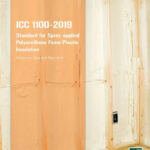 The ANSI-approved standard BSR/ICC 1100 — Standard for Spray-Applied Polyurethane Foam Plastic Insulation establishes the minimum physical and performance properties as well as application requirements for spray-applied foam plastic insulations. The standard will be included for reference in the 2021 International Codes.
The ANSI-approved standard BSR/ICC 1100 — Standard for Spray-Applied Polyurethane Foam Plastic Insulation establishes the minimum physical and performance properties as well as application requirements for spray-applied foam plastic insulations. The standard will be included for reference in the 2021 International Codes.
The 2019 edition of BSR/ICC 1100 is available online and in the Code Council store.
Visit the ICC Foam Plastic Insulation Standard Committee (IS-FPI) webpage for more information on standards activities related to IS-FPI as well as meeting notices and agendas, committee information, and other resources.
ICC 1200 — Standard for Off-Site Construction: Planning, Design, Fabrication and Assembly
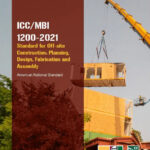 Standard ICC 1200 — Standard for Off-Site Construction: Planning, Design, Fabrication and Assembly would address all facets of the off-site construction process, including planning, designing, fabricating, transporting, and assembling commercial and residential building elements. The standard includes componentized, panelized and modularized elements and will not apply to the United States Department of Housing and Urban Development manufactured housing.
Standard ICC 1200 — Standard for Off-Site Construction: Planning, Design, Fabrication and Assembly would address all facets of the off-site construction process, including planning, designing, fabricating, transporting, and assembling commercial and residential building elements. The standard includes componentized, panelized and modularized elements and will not apply to the United States Department of Housing and Urban Development manufactured housing.
Visit the ICC Off-Site and Modular Construction Standards Committee (IS-OSMC) webpage for more information on standards activities related to IS-OSMC as well as meeting notices and agendas, committee information, and other resources.
The 2021 edition of ICC 1200 is available online and in the Code Council store.
| UPDATES: The Code Council greatly appreciates the effort and commitment that the committee recently put forth to develop the new 2021 edition. The standard received ANSI approval on July 19, 2021. Publication of the first edition has been completed and is available in the Code Council store. |
ICC 1205 — Standard for Off-Site Construction: Inspection and Regulatory Compliance
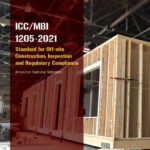 Standard ICC 1205 — Standard for Off-Site Construction: Inspection and Regulatory Compliance would address the inspection, approval and regulatory compliance of off-site residential and commercial construction components and their assembly and completion at the final building site. This includes permitting, in-plant and on-site final inspections, third-party inspections, and the role of industrialized building departments, state modular programs and the authority having jurisdiction. The standard includes componentized, panelized and modularized elements and will not apply to the United States Department of Housing and Urban Development manufactured housing. The development of this standard falls under the purview of the IS-OSMC committee.
Standard ICC 1205 — Standard for Off-Site Construction: Inspection and Regulatory Compliance would address the inspection, approval and regulatory compliance of off-site residential and commercial construction components and their assembly and completion at the final building site. This includes permitting, in-plant and on-site final inspections, third-party inspections, and the role of industrialized building departments, state modular programs and the authority having jurisdiction. The standard includes componentized, panelized and modularized elements and will not apply to the United States Department of Housing and Urban Development manufactured housing. The development of this standard falls under the purview of the IS-OSMC committee.
Visit the ICC Off-Site and Modular Construction Standards Committee (IS-OSMC) webpage for more information on standards activities related to IS-OSMC as well as meeting notices and agendas, committee information, and other resources.
The 2021 edition of ICC 1205 is available online and in the Code Council store.
| UPDATES: The Code Council greatly appreciates the effort and commitment that the committee recently put forth to develop the new 2021 edition. The standard received ANSI approval on July 19, 2021. Publication of the first edition has been completed and is available in the Code Council store. |
ICC 1210 — Standard for Mechanical, Electrical, Plumbing Systems, Energy Efficiency and Water Conservation in Off-Site Construction
As an ANSI-accredited standards-developing organization, the Code Council is partnering with the Modular Building Institute in the development of this new comprehensive standard to address mechanical, electrical and plumbing (MEP) used in off-site construction. This standard will be part of the 1200 series portfolio of standards to address the challenges faced by the off-site construction industry.
Standard ICC 1210 — Standard for Mechanical, Electrical, Plumbing Systems, Energy Efficiency and Water Conservation in Off-Site Construction would address requirements for the energy efficiency and water conservation of off-site construction projects and the planning, designing, fabricating, transporting and assembling of commercial and residential building MEP system elements. This includes the componentization and modularization of elements of MEP systems, the incorporation of MEP systems in componentized, panelized or modularized building elements, and the achievement of energy efficiency and water conservation requirements in off-site construction. This standard will not apply to U.S. Department of Housing and Urban Development manufactured housing.
| UPDATES: Final committee appointments were made by the Code Council Board of Directors at its September 2021 meeting. The first public committee meeting was held on Dec. 15, 2021. The next meeting is scheduled for 2:00 p.m. CT on Feb. 9, 2022, with subsequent meetings held at three-week intervals. Future committee meetings will be public with notices posted to the committee webpage and sent to those on the interested party list. Anyone may participate on the various work groups that have been created by the committee. |
ICC 1300 — Standard for the Vulnerability-Based Seismic Assessment and Retrofit of One- and Two-Family Dwellings
The Code Council is developing a comprehensive standard to provide a methodology for the identification, evaluation and retrofit of specific known vulnerabilities for one- and two-family wood light-frame residential buildings (including townhouses) up to two stories in height. Also included are the evaluation and retrofit of masonry chimneys attached to three-story buildings. Development of the assessment and retrofit provisions are applicable to dwellings located in Seismic Design Categories B through E and will include the use of the best available seismic numerical modeling tools and engineering practices to assist in the development of assessment methods and to identify retrofit criteria to best achieve targeted performance objectives. The use of the provisions are anticipated to improve earthquake performance but are not intended to prevent earthquake damage. The new standard will be developed in accordance with ANSI’s Essential Requirements.
Visit the ICC Residential Seismic Assessment and Retrofit Standard Consensus Committee (IS-RSARC) webpage for more information on standards activities related to IS-RSARC as well as meeting notices and agendas, committee information, and other resources.
| UPDATES: News updates and future public meeting notices, agendas and minutes are posted on the committee webpage. The most recent meeting of the committee was held on Dec. 14, 2021. The next meeting is scheduled for 2:00 p.m. CT on Feb. 17, 2022. |
ICC A117.1 — Accessible and Usable Buildings and Facilities
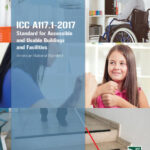 The 2017 edition provides technical criteria that will allow a person with a physical disability to independently get to, enter and use a site, facility, building or element. The 2017 edition was approved by the American National Standards Institute as an American National Standard on March 28, 2017.
The 2017 edition provides technical criteria that will allow a person with a physical disability to independently get to, enter and use a site, facility, building or element. The 2017 edition was approved by the American National Standards Institute as an American National Standard on March 28, 2017.
The 2017 edition of ICC A117.1 is available online and in the Code Council store.
| UPDATES: The revision cycle to update the 2017 edition is currently open. The most recent public review period to submit public comments concluded on April 5, 2021. The comments have been arranged in an agenda for committee consideration and have been posted to the committee website. The next public meeting of the committee has been scheduled for 11:00 a.m. CT on Feb. 24, 2022. |
ANSI accreditation
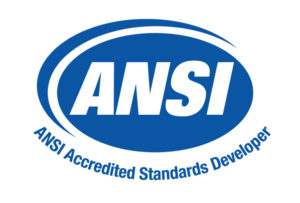 The International Code Council is accredited by the American National Standards Institute (ANSI) as a standards developing organization that adheres to ANSI’s Essential Requirements for openness, balance, consensus and due process. Participation of the various stakeholders in an equitable, accessible and responsive environment is key in developing a consensus standard for recognition as an American National Standard.
The International Code Council is accredited by the American National Standards Institute (ANSI) as a standards developing organization that adheres to ANSI’s Essential Requirements for openness, balance, consensus and due process. Participation of the various stakeholders in an equitable, accessible and responsive environment is key in developing a consensus standard for recognition as an American National Standard.
The Code Council’s experience as a structured platform upon which consensus is achieved from industry stakeholder input places the Code Council in an ideal position as a standards developer. The Code Council also has the capability to augment the resources of other standards developing organizations seeking to develop standards for their respective industries. With more than 64,000 members, the Code Council’s reach touches upon individuals experienced in facets peripheral to the building industry. In other words, the Code Council can develop ANSI-approved standards not just related to building codes.
The latest version of the Code Council’s Consensus Procedures — used to develop Code Council standards — was ANSI approved in August 2021. As a standards-developing organization, this current version provides the Code Council with a streamlined method to develop standards in a most time-efficient manner.
Standards development process
The Code Council adheres to openness and transparency in our standards development process. All Code Council standards committee meetings are open to the public. Any interested party can participate in committee meetings and can be considered by the committee for membership on any workgroup that the committee creates.
Click here to learn more about the standard development process as well as standard development policy and procedures and Standard Development and Consensus Committees.








